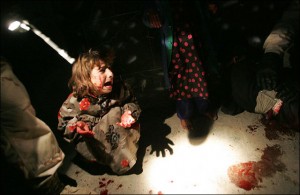Last weekend, the federal New Democratic Party (NDP) elected a new leader: Thomas Mulcair, an MP from Quebec, who was a minister in the provincial Liberal government there, before he resigned rather than open a park for development.
Mulcair was the front runner, and his victory was hardly a surprise. Many NDPers thought that he would move to the center and would abandon left-wing principles in pursuit of power, and a number of key members of the prior leader’s team have left.
I had my doubts, but Mulcair has gone a long way to assuage them in just a week. First, this, in his first day in Parliament:
Speaking to reporters afterward, he laid out his concerns for the state of the Canadian economy and accused the federal government of neglecting workers as it promotes the extraction of natural resources, mainly in Western Canada.
“That’s driven up the value of the Canadian dollar, made it more difficult to export our own goods. We’re killing our manufacturing sector,” he said. “The way the Conservatives are acting has had a devastating impact on good jobs with pensions.”
There was a lot of whining from Alberta about this statement, but it’s just a fact. The classic Canadian economy was a mixed one, which combined resource extraction and manufacturing. When manufacturing does well, resources generally don’t. When resources do, manufacturing doesn’t. In the old model this was considered a strength, since it meant that part of the economy was doing well, no matter what resource prices were. And when one sector was up, it was meant to subsidize the other sector.
Resource booms always end. Every single one. The oil boom will end, the question is when. If Canada doesn’t have a manufacturing sector left when the boom ends, we will become a basket case South American country. And Alberta will become the new Maritimes (remember, the Maritimes was originally a resource boom area.)
Politically speaking, this is also smart, because the NDP just isn’t going to get a lot of MPS out of Alberta in specific or the Prairies in general. If attacking the tar sands, and calling for Canada to add value to resources before shipping them out of the country costs votes there, so be it. The battleground is not Alberta. Alberta went all in with the Conservatives, and they have to live with that. There’s no point in pandering to Albertans, it would take a huge shift in voting to gain many more seats.
The places in play are the Maritimes and Ontario, and it is there that the election will be won or lost. It is Ontario which has been losing its manufacturing due to the high dollar, and the Maritimes has been treated shoddily by the Conservatives as well. So on both politics and economics Mulcair’s stance is a good one, which appeals to the regions where the NDP can make gains and pisses of people who would never vote NDP anyway.
Then there was this, yesterday, when the Tory austerity budget was unveiled:
“The Conservatives have caused the problem by gutting the fiscal capacity of the government,” Thomas Mulcair, the newly crowned NDP leader, said Wednesday.
“Now they’re saying, oh, gee whiz, no more fiscal capacity in the government, we know what we’ll do, we’ll start cutting the services of the government.”
Oh my, pointing out the obvious. Conservative tax cuts and reckless spending caused the defict. But tax cuts for rich people are sacrosanct, so old folks will have to wait till 67 to retire.
And this:
“Everything indicates the Conservative budget will be synonymous with cutbacks and job losses. A few months ago, the Prime Minister promised textually, in this House, that he would not touch pensions, would not cut health transfers to the provinces, would not touch services to the population?” Mr. Mulcair said. “Will the Prime Minister live up to his word, or will he break his promise?”
And then, Harper cut pensions and cut health transfer to the provinces.
Ouch. That had to smart.
Yeah, I’m liking Mulcair.
One of the things which has distressed me most about the West is that no one on the left has really been willing to hammer the politics of class. Mulcair, who has also hit inequality, shows some signs of doing so. It is conventional wisdom that tax increases won’t fly, but the polling data doesn’t support that, at least not if you want to tax the rich and make that clear. Heck, if even Globe and Mail readers (the primary business newspaper in Canada) want tax increases and more spending, I think we can conclude that it’ll fly (yes, I’m aware of the limitations of that particular poll). But even the upper middle and lower upper class think that the true rich should pay their share. Coming out of Quebec, which is somewhat insulated from the political culture of the rest of North America, Mulcair seems willing to play class politics, and seems to know how to do so.
So far, so good. And as for the budget, Prime Minister Harper isn’t going to get the cuts he wants from the public service without causing great pain. Nor is cutting other forms of spending going to help the economy. Harper better get down on his knees and pray to God that there isn’t a major downturn in China, because he’s betting everything on resource prices. If they crumble, the Canadian economy will go with them. And so will Harper’s job.
This is opposition politics 101: whatever the government does, you oppose. If Harper’s bet on the resource economy works, then the Conservatives will get another term. If it doesn’t, the NDP needs to be seen as the party which opposed his policies. Mulcair is positioning them for that, and doing so in a way which allow him, if he gets in power, to put in place policies which will reward the constituencies he needs to win—everyone not attached to the oil teat.

